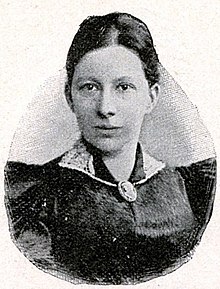Girls and women groups for social aid work
The girls and women groups for social aid work , which were first founded in Berlin, supported young girls and women of the upper middle class in their search for a “meaningful job”.
history
The association was constituted on December 8, 1893 in Berlin . The initiators were sociopolitically committed and prominent women and men such as Jeanette Schwerin , Henriette Goldschmidt , Lina Morgenstern , Franziska Tiburtius , Gustav Schmoller , Max Sering , Henriette Schrader-Breymann and her husband Karl Schrader . Minna Cauer and the young lawyer Max Otto Köbner were the main actors and driving forces. Their intention was to bring up young girls and women of the upper middle class for voluntary support in the poor and welfare work in order to fulfill their obligation towards the poorer classes through the commitment of personal care. In this regard, it was clearly emphasized that it was about 'no emancipation efforts whatsoever', 'only about drawing young girls and women to serious duty in the service of the whole' . Nonetheless, it must have played a role, at least among the female initiators, not only to bring in people for charitable work, but also to recruit young people for the women's movement . The girls and young women should go to day nurseries, after-school care centers, orphanages, homes for the blind, people's kitchens, employment agencies for voluntary workers, clothing stores, evening homes or leisure clubs for female workers, in hospital care and the like. like m. become active, also give free piano lessons or take walks with small pensioners.



Jeanette Schwerin led the groups until her death in 1899 . The Berlin groups were a role model for further startups in other cities in Germany, such as Bremen, Frankfurt / Main, Hamburg, Königsberg, Leipzig, Stuttgart etc.
Attempts were made in courses to impart the knowledge and skills necessary for voluntary social work:
“The training activities began with lectures that were generally educational, offer professional orientation and should help women understand the situation of the working classes. The lectures covered topics from the field of law, economics, basic teachings of poor and child welfare . A lecture event on the subject of 'Social Aid Activities in England and America' indicates that the international reference also played a role in the field of content training from an early stage. "
In 1897 Jeanette Schwerin began planning fixed annual courses for professional training in welfare work . In doing so, she created the basis for professional social work. In 1899, the same year that Jeanette Schwerin died, the first annual course was held with the participation of Emil Münsterberg . This comprised a theoretical and practical part: instruction on economic and social conditions, public health care and related areas, practical work in various welfare institutions.
Following took Alice Salomon chair the group . It had decisively and innovatively influenced their profile and further development. The new chairwoman sought, in close cooperation with the groups and the Berlin Association for Popular Education, to found her own training facility, which began its work in 1908 as a women's social school .
From the 1920s the groups were hardly present in public, not until around 1930. The last series of lectures was held in the winter of 1932/33. The topic was, according to Karl Jaspers published in 1931 and widespread publication: The spiritual situation of the time . On March 2, 1933, the last board meeting of the association that is now called women's group for social work took place. In addition to Alice Salomon, the following were present: Hildegard Böhme , Charlotte Dietrich , Hildegard von Gierke , Hilde Lion , Dora Peyser , Käte Rosenheim and Siddy Wronsky .
swell
- Girls and women groups for social aid work in Berlin (ed.): Memorandum on the occasion of the 10th anniversary 1883–1903. Berlin undated
- Alice Salomon: Twenty Years of Social Aid Work. On the occasion of the twentieth anniversary of the 'Girls and Women's Groups for Social Aid Work' in Berlin . Berlin 1913
literature
- Judith Grässler: The "Girls' and Women's Groups for Social Aid Work" and their contribution to the professionalization of social work in Germany . Stuttgart 2004 (unpublished diploma thesis)
- Anette Kniephoff-Knebel: Internationalization in Social Work. A lost dimension of the feminine career and history of ideas . Wochenschau-Verlag, Schwalbach am Taunus 2006, pp. 79-82, ISBN 3-89974-284-2 .
- Carola Kuhlmann: Alice Salomon . Your life's work as a contribution to the development of the theory and practice of social work . Deutscher Studien Verlag, Weinheim 2000, ISBN 3-89271-927-6 .
- Christoph Sachße: Motherhood as a job. Social work, social reform and the women's movement 1871 to 1929 . Beltz, Weinheim / Basel / Berlin 2003, pp. 103–111, ISBN 3-407-55894-5 .
- Iris Schröder: work for a better world. Women's movement and social reform 1890–1914 . Campus, Frankfurt am Main 2001, pp. 82–91, ISBN 3-593-36783-1 (= history and gender , volume 36; also dissertation FU Berlin 2001).
- Anja Schüler: Women's Movement and Social Reform. Jane Addams and Alice Salomon in the Transatlantic Dialogue 1889–1933 . Steiner, Stuttgart 2004, pp. 190–211, ISBN 3-515-08411-8 (= Transatlantic Historical Studies , Volume 16, also a dissertation at the Free University of Berlin 2000 under the title: Dienst am Volksganzen ).

